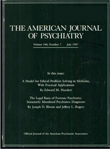Overview: the sex of the therapist
Abstract
Research studies about the relevance of therapist gender to assessment, duration of treatment, and satisfaction with treatment or its outcome provide no clear, replicable results salient to decision making. Psychoanalytic and other clinical writings deal with the impact of clinician gender on the course or outcome of psychotherapy. Effects appear to depend on many factors, including the type and goal of psychotherapy, the patient's developmental level, the early relationship with parents, and the nature of object relationships and specific conflictual areas, as well as the therapist' sensitivity and value system regarding gender issues. No specific conclusions as to optimal patient-therapist matches on the basis of therapist sex appear warranted.
Access content
To read the fulltext, please use one of the options below to sign in or purchase access.- Personal login
- Institutional Login
- Sign in via OpenAthens
- Register for access
-
Please login/register if you wish to pair your device and check access availability.
Not a subscriber?
PsychiatryOnline subscription options offer access to the DSM-5 library, books, journals, CME, and patient resources. This all-in-one virtual library provides psychiatrists and mental health professionals with key resources for diagnosis, treatment, research, and professional development.
Need more help? PsychiatryOnline Customer Service may be reached by emailing [email protected] or by calling 800-368-5777 (in the U.S.) or 703-907-7322 (outside the U.S.).



